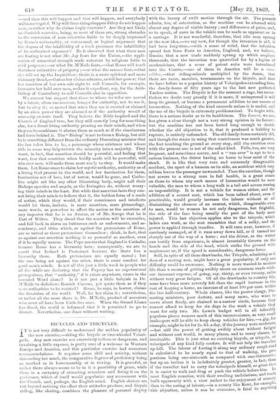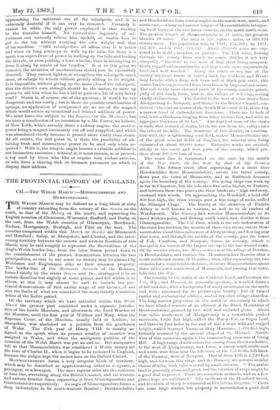BICYCLES AND TRICYCLES.
T is not very difficult to understand the sudden popularity of 1 the new exercise,—riding the bicycle or two-wheeled Velocipede. Any new exercise not excessively tedious or dangerous, and involving a little expense, is pretty sure of a welcome iu Western Europe and America, and this particular exercise had numerous recommendations. It requires some skill and activity, without demanding too much, the comparative degrees of proficiency being as marked as in horsemanship or in rowing. It is graceful, or rather there always seems to be in it a possibility of grace, while there is a certainty of attracting attention and fixing it on the performer, which of itself would popularize any amusement with the French, and, perhaps, the English mind. English skaters are not beyond noticing the effect their attitudes produce, and bicycle tiding, like skating, combines the pleasure of personal display
with the luxury of swift motion through the air. The pursuit admits, too, of ostentation, as the machine can be adorned with almost auy degree of visible luxury ; and differences of price, and so to speak, of caste in the vehicle can be made as apparent as iu a carriage. It is not wonderful, therefore, that idle men sprang at the new idea,—we say new, for though the invention is old, it had been forgotten,—with a sense of relief, that the infection spread fast from Paris to America, England, and, we believe, Russia; that a new trade suddenly sprang up which employs thousands, that the invention was quarrelled for by a legion of mechanicians, that a score of patent suits were introduced into the Courts,—one of them in America will be a cause celebre,—that riding-schools multiplied by the dozen, that there are races, matches, tournaments on the bicycle, and that we have before us a popular history of Velocipedes extending from the dandy-horse of fifty years ago to the last new perfected Yankee notion. The Bicycle is for the moment a rage, but nevertheless we doubt very greatly if it is more, if unimproved it will keep its ground, or become a permanent addition to our means of locomotion. Nothing of the kind succeeds unless it is useful, and the use of the bicycle is extremely problematical. To begin with, there is a serious doubt as to its healthiness. The Lancet, we see, has given a clear though not a very strong opinion in its favour; but the machine has not been tested long enough to decide whether the old objection to it, that it produced a liability to rupture, is entirely unfounded. The old dandy-horse certainly did, and though the strain in using that contrivance was much greater, the feet touching the ground at every step, still the exertion even with the present one is not of the safest kind. Falls, too, are very frequent, and sometimes severe, and a " run over" is apt to be a serious business, the driver having no horse to bear most of the shock. It is like that very rare and extremely disagreeable accident, the upset of a hansom on its side, an accident which very seldom leaves the passenger unwounded. Then the exertion, though not severe to a strong man in full health, is a great strain on those to whom any such means of locomotion would be most valuable, the men to whom a long walk is a toil and severe rowing an impossibility. It is not a vehicle for women either, and the addition of a second seat, which has been talked about, even if practicable, would greatly increase the labour without at all diminishing the chances of an overset, which, disagreeable even to men, would to women be not only dangerous, but frightful, the side of the face being usually the part of the body most injured. This last objection applies also to the tricycle, which ladies can work, as the seat resembles that of a sulky, and the power is applied through treadles. It will turn over, however, if carelessly managed, or if it runs away down hill, or if turned too sharply out of the way of a horse ; and the driver, as the writer can testify from experience, is almost invariably thrown on the hands and the side of the head, which strike the ground with unpleasant or, if the speed is considerable, dangerous force. Still, in spite of all these drawbacks, the Tricycle, admitting as it does of a resting seat, might have a great popularity, if only one difficulty could be overcome. Nothing is more wanted in modern life than a means of getting swiftly about on common roads without incessant expense, of going, say, thirty, or even twenty, miles without very great fatigue. Of all the drawbacks to country life, none have been more severely felt than the rapid increase in the cost of keeping a horse, an increase of at least 100 per cent. within the last half-century. Whole classes, like the poorer clergy, Dissenting ministers, poor doctors, and many more, who want to move about freely, are chained to a narrow circle, because they cannot afford to keep for six days in the week a vehicle they want for only two. Mr. Lowe's budget will in all tolerably populous places remove much of this inconvenience, as very small innkeepers will be able to keep cheap vehicles for hire,—a gig, for example, might be let for 2s. 61. a day, if the journey were moderate, —but still the power of getting swiftly about without fatigue and without cost would, in many places, and to many classes, be invaluable. This is just what no existing bicycle, or tricycle, or velocipede of any kind fully confers. It will not help the traveller up-hill. The labour of forcing it along any ordinary rough road is calculated to be nearly equal to that of walking, the proportions being one-sixteenth as compared with one-thirteenth , but up an incline it is indefinitely greater, greater, in fact, than , if the traveller had to carry the velocipede himself, so great that it is easier to walk and drag or push the vehicle before him. In most English counties, with their swelling undulations, and roads built apparently with a view rather to the enjoyment of scenery than to the saving of labour,—in a county like Kent, for example, this objection, unless it can be overcome, is fatal to anytln. approaching the universal use of the velocipede, and it is extremely doubtful if it can ever be removed. Certainly it cannot be while the only power employed is that residiug in the traveller himself. No conceivable ingenuity of adjustment can seriously relieve him up-hill, or enable him to get to the top without carrying his own weight and that of his machine. " Old velocipedists all affirm that it is better and wiser on long journeys to walk up the hills, for there is a much less expenditure of power in walking up the hills and leading the bicycle, or even pushing a four-wheeler, than in attempting to force it along by means of the treadles." It is to this point we conceive the attention of mechanicians should now be exclusively directed. They cannot lighten or strengthen the velocipede much more, or enlarge its wheels without greatly adding to its weight. Is it impossible, without giving up the main idea of the velocipede, that the driver's own strength should be the motor, to store up power to aid him when he has a hill to pass or a bit of very heavy road ? Steam is, of course, out of the question ; it would be too dangerous and too costly ; but is there no possible combination of springs, no application of compressed air, no use of the magnet which would secure an occasional and limited addition of power. We must leave the subject to the Engineer or the Mechanic, but we have a recollection of an invention by a Mr. Porter, we believe, of New York, which actually drove a railway engine, the motivepower being a magnet incessantly cut off and reapplied, and which was abandoned chiefly because it proved more costly than steam. At all events, the real point is, is there the possibility of obtaining fresh and intermittent power to be used only when required ? With it, the tricycle might become a valuable addition to our locomotive resources ; without it, it must remain, as at present, a toy used by those who like or require very violent exercise, or who have a skating rink or bitumen pavement ou which to display their address.































 Previous page
Previous page